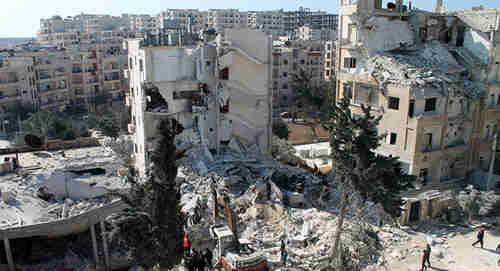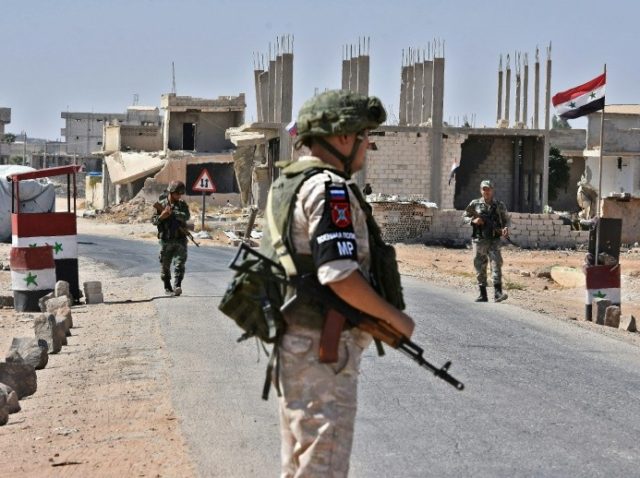This morning’s key headlines from GenerationalDynamics.com
- As October 25 deadline approaches, Syria’s Idlib is set up for a classic Greek tragedy
- Turkey and Russia reach an agreement to prevent the Idlib assault
- The inevitable clash of the protagonists
As October 25 deadline approaches, Syria’s Idlib is set up for a classic Greek tragedy

Idlib Syria (AFP)
For months, international observers have been fearing a massive humanitarian disaster in Syria, as the regime of Syria’s president Bashar al-Assad prepares to launch an attack on Idlib province, the last stronghold of the opposition rebels, backed by Russia, Iran and Hezbollah.
The al-Assad regime has already recaptured Aleppo, Ghouta and Daara, using Vladimir Putin’s “Grozny Model,” which forces all the women and children out into the open so that they be slaughtered en masse. Al-Assad enhanced and upgraded the technique into what we might call “Grozny Model 2.0,” using chlorine gas to force women and children out of their basement hiding places, and then use Sarin gas and barrel bombs as needed to slaughter as many as possible.
Many of the civilians and opposition forces in Aleppo, Ghouta, and Daara fled with their families to Idlib province, as possibly the only safe place left in Syria, with the result that the population of Idlib province doubled to about 3 million people. Turkey already hosts 3.5 million Syrian refugees, and an assault on Idlib would create a massive humanitarian problem, with perhaps a million people flooding across the border into Turkey, and from there into Europe, creating an international crisis.
Turkey was desperate to stop al-Assad’s Idlib assault because it would be a disaster for Turkey, so Turkey’s president Recep Tayyip Erdogan lobbied Putin to cancel the assault. Turkey, Russia, and Iran held a meeting in Tehran on September 7, but Turkey’s proposal was rejected by the other two parties. ( “8-Sep-18 World View — Turkey fails to prevent Russia and Iran from mass slaughter in Idlib, Syria”) Reuters and Irin News and Middle East Media Research Institute (MEMRI)
Turkey and Russia reach an agreement to prevent the Idlib assault
However, on September 17, Erdogan and Putin met in Sochi, and they reached an agreement:
The Republic of Turkey and the Russian Federation, as guarantors of the observance of the ceasefire regime in the Syrian Arab Republic, … in order to stabilize the situation in the Idlib de-escalation area as soon as possible, have agreed on the following:
1. The Idlip de-escalation area will be preserved and Turkish observation posts will be fortified and continue to function.
2. The Russian Federation will take all necessary measures to ensure that military operations and attacks on Idlib will be avoided and the existing status quo will be maintained.
3. A demilitarized zone, 15-20 kms deep in the de-escalation area will be established.
4. The delineation of exact lines of the demilitarised zone will be determined through further consultations.
5. All radical terrorist groups will be removed from the demilitarised zone by October 15.
6. All tanks, MLRS, artillery and mortars belonging to conflicting parties will be withdrawn from the demilitarised zone by October 10, 2018.
7. Turkish Armed Forces and the military police of the Armed Forces of the Russian Federation will conduct coordinated patrols and monitoring with UAVs along the boundaries of the demilitarised zone. …
8. Transit traffic on the routes M4 (Aleppo-Latakia) and M5 (Aleppo-Hama) will be restored by the end of 2018.
9. Effective measures will be taken for ensuring sustainable ceasefire regime within the Idlib de-escalation area. In this regard, the functions of the Joint Iranian-Russian-Turkish Coordination Center will be enhanced.
10. The two sides reiterated their determination to combat terrorism in Syria in all forms and manifestations.
Bashar al-Assad and the Syrian government were not part of this agreement, but it has become Russia’s responsibility to hold al-Assad back from launching the assault.
The heart of this agreement is that it places an enormous responsibility on Turkey. All rebels in the demilitarised zone must withdraw heavy arms by October 10, and radical groups must leave by October 15, and Turkey is responsible for making that happen. Unfortunately, with only five days left until the first deadline, little has changed on the ground since the September 17 agreement except for contentious negotiations among the groups in Idlib. There has been almost no handover of weapons or territory.
Of the three million people in Idlib, it is estimated that about 60,000 are in anti-Assad militias controlling different cities and villages. Some of the moderate rebel groups have begun withdrawing their forces and heavy weapons from parts of the buffer zone. But the biggest jihadi group, the al-Qaeda linked Hayat Tahrir al-Sham (HTS), which controls 60 percent of Idlib, has not yet agreed to withdraw, although it is still negotiating with Turkey. The National (UAE) and Sputnik News (Moscow)
The inevitable clash of the protagonists
The Greeks invented tragedy, and three of four great tragic artists of all time were Aeschylus, Sophocles, and Euripides of ancient Greece, with the fourth being Shakespeare. As a Greek, I understand tragedy very well. The essence of Greek tragedy is that the tragic event is not random, but is inevitable, because of the nature, the personality, and the character of the protagonists. A true tragedy cannot be prevented, even by those who foresee it, because the forces bringing about the tragedy are too powerful for anyone to stop.
We can see those powerful forces in Syria today.
First, we have Bashar al-Assad, a psychopathic monster and a member of the Shia/Alawite community in Syria, a group that has had many wars with Sunni Arabs, including Turks. Al-Assad has repeatedly made it clear that he considers all Sunnis in Idlib, even the women and children, terrorists who much be exterminated like cockroaches. Al-Assad is the most Shakespearean of the protagonists in that he is driven to commit a bigger genocide than his father, Hafez al-Assad.
Reports indicate that the al-Assad regime has been massing its army on the border with Idlib. Putin has been holding al-Assad back from assaulting Idlib, and al-Assad is looking for any excuse to attack. If the agreement deadlines pass and Turkey has not completed its tasks, then al-Assad will have the excuse he needs.
Second, we have Russia’s president Vladimir Putin. I do not get the feeling that Putin has any particular animus against either side in Syria. He seems to view the war in Syria the same way that Henry David Thoreau watched in astonishment the war between the two armies, one army of red ants and another army of black ants.
Instead of ethnic animus, Putin seems to have an entirely different kind of motive for supporing al-Assad. Russia was completely shut out of the Mideast in the 1990s after the collapse of the Soviet Union. Now, for the first time in decades, Russia has two military bases in the Mideast – the Tartus naval base and the Hmeimim airbase, both of them in Syria, in return for supporting al-Assad.
So Russia is holding al-Assad back for now, but when the dam breaks and the Syrian army pours into Idlib, Russia will support al-Assad in order to continue to control the two military bases.
And the third major protagonist is Turkey’s president Erdogan. Al-Assad and Erdogan share a deep vitriolic hatred of each other, as do their respective populations. Erdogan truly wants to prevent al-Assad’s assault on Idlib because it will be a disaster for Turkey.
Iran is like Russia, having little vitriolic hatred for either side in Syria, but wanting to establish an overland route from Iran through Baghdad through Damascus to the Mediterranean Sea. For that, Iran is supporting al-Assad.
Hezbollah is like a mindless puppet, where Iran is the puppetmaster. Hezbollah will do whatever Iran tells it to do.
There are also lesser forces in Syria, including the United States and Saudi Arabia. They play their parts in support of one group or another, but they are subordinate to Syria, Russia, and Turkey.
One day soon, all of these forces will clash and the inevitable final act of the Greek tragedy will begin. Al Jazeera and Digital Journal and Deutsche Welle and Al Jazeera
Related Articles:
- Turkey scores diplomatic victory, as Russia backs down from Idlib assault in Syria (18-Sep-2018)
- Syria and Russia prepare to inflict massive bloodbath on Idlib (05-Sep-2018)
- Russia demands that US and EU pay to rebuild Syria (23-Aug-2018)
- US increasingly expresses total disgust with Syria regime for Bashar al-Assad’s atrocities (21-Sep-2016)
- Book review review: Christopher Hitchens: ‘God Is Not Great: How Religion Poisons Everything’ (II) (03-Jun-2007)
KEYS: Generational Dynamics, Syria, Idlib, Bashar al-Assad, Russia, Vladimir Putin, Grozny Model, Aleppo, Ghouta, Daara, Turkey, Recep Tayyip Erdogan, Iran, Hezbollah, Hayat Tahrir al-Sham, HTS, Aeschylus, Sophocles, Euripides, Shakespeare, Hafez al-Assad, Henry David Thoreau, Tartus naval base, Hmeimim airbase
Permanent web link to this article
Receive daily World View columns by e-mail

COMMENTS
Please let us know if you're having issues with commenting.